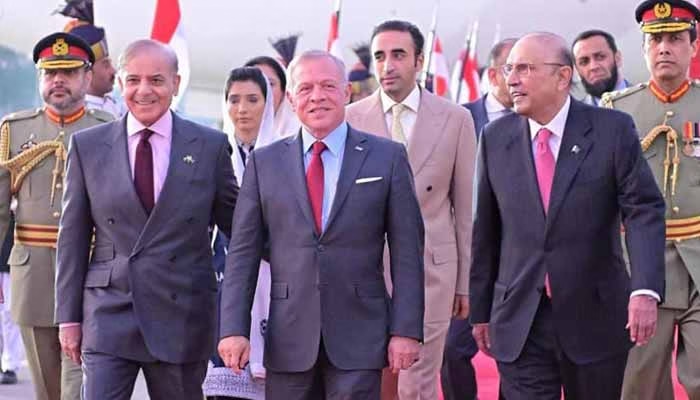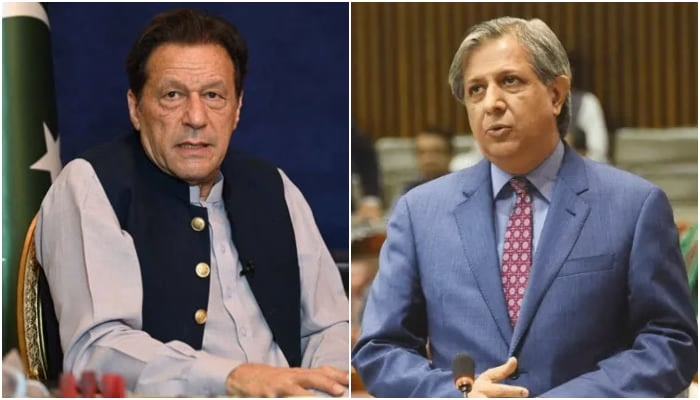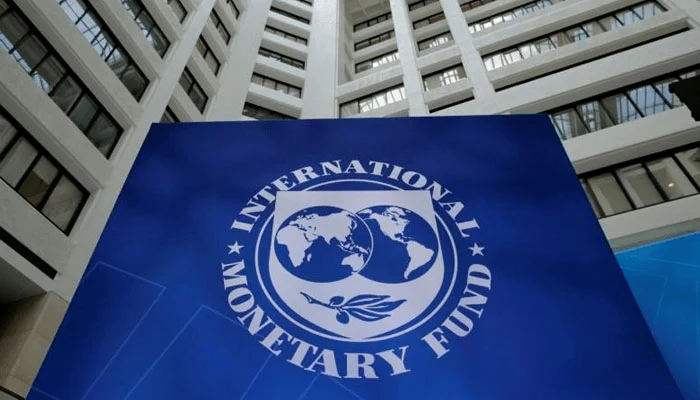King Abdullah II’s visit to Pakistan marks a significant moment in the longstanding relationship between the two brotherly nations. The two-day official visit from November 15–16 highlights the growing political, defence, and economic cooperation that both countries aim to deepen. His arrival was warmly welcomed by Pakistan’s top leadership, signaling the importance Islamabad attaches to its ties with Amman.
Upon landing at PAF Base Nur Khan in Rawalpindi, King Abdullah II was received by President Asif Ali Zardari, Prime Minister Shehbaz Sharif, First Lady Aseefa Bhutto-Zardari, PPP Chairman Bilawal Bhutto-Zardari, and senior government officials. The grand reception reflected Pakistan’s appreciation for Jordan’s role in regional peace and Islamic unity.
President Zardari expressed confidence that King Abdullah II’s visit to Pakistan would contribute to adding a new strategic dimension to bilateral relations. He highlighted that the foundation of Pakistan–Jordan ties rests on historical brotherhood, mutual trust, and shared cultural and religious values. Over the decades, both nations have continued to support each other in regional and international matters, particularly concerning the Muslim world.
Shortly after his arrival, King Abdullah II proceeded to the Prime Minister House, where he was presented with a ceremonial Guard of Honour. This was followed by warm official exchanges, symbolizing the trust and respect shared between the two countries’ leadership.
During the visit, the King is scheduled to hold important meetings with Prime Minister Shehbaz Sharif. These include a one-on-one discussion followed by delegation-level talks. Issues related to defence cooperation, economic partnership, regional stability, and enhanced diplomatic coordination are expected to dominate the agenda. Both sides are likely to explore new avenues to strengthen ties in trade, investment, agriculture, and technology, areas where Jordan and Pakistan see promising potential.
The Foreign Office had confirmed the visit a day earlier, announcing a special ceremony at Aiwan-e-Sadr where King Abdullah II will be awarded Pakistan’s highest civilian honour. This prestigious recognition reflects Pakistan’s deep respect for the King’s leadership and his contributions to peace, interfaith harmony, and cooperation among Muslim nations.
The timing of King Abdullah II’s visit to Pakistan is particularly noteworthy. It follows the recent visit of Pakistan’s Chief of Army Staff (COAS), Field Marshal Syed Asim Munir, to Jordan. During that trip, Field Marshal Munir met King Abdullah II and Jordan’s military leadership to discuss defence collaboration and security partnerships. The close military engagement underscores the strong strategic alignment between the two countries.
Over the years, Pakistan and Jordan have maintained robust defence cooperation, with regular training exchanges and coordinated efforts to combat terrorism and promote regional stability. The current visit provides an opportunity to expand this cooperation even further, particularly in modern defence systems, intelligence sharing, and joint military training programs.
Economically, both countries aim to boost bilateral trade, which remains below potential despite shared opportunities. Pakistan can benefit from Jordan’s experience in water management, renewable energy, and agricultural innovation, while Jordan can explore greater access to Pakistan’s large consumer market and expanding industrial sectors. The visit is expected to pave the way for new agreements and partnerships in these fields.
Moreover, King Abdullah II’s visit to Pakistan carries symbolic weight for the broader Muslim world. Both leaders share a deep commitment to addressing issues affecting Muslim-majority countries, including the Palestinian cause, regional conflicts, and global Islamophobia. Pakistan and Jordan have often worked together at international forums such as the Organisation of Islamic Cooperation (OIC) and the United Nations to advocate for peace and justice.
Cultural and educational cooperation is another important pillar of the relationship. Thousands of Pakistani students study in Jordanian universities, and there is growing interest in expanding academic exchanges, research collaboration, and cultural diplomacy. The King’s visit may lead to new initiatives aimed at connecting youth and scholars from both nations.
In conclusion, King Abdullah II’s visit to Pakistan is more than a ceremonial engagement it represents a meaningful step forward in strengthening bilateral relations rooted in friendship, faith, and shared global aspirations. As both countries navigate a rapidly changing regional landscape, this visit sets the stage for renewed cooperation in defence, economy, diplomacy, and cultural exchange. It highlights the commitment of Pakistan and Jordan to building a future that reflects mutual respect, strategic partnership, and a shared vision for peace and development in the Muslim world.



